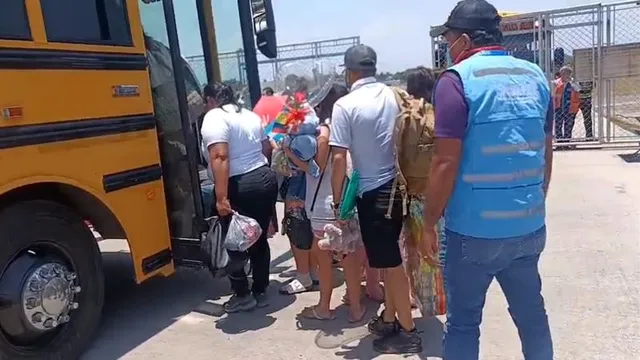
First self-deportation flight carries migrants back home
2025-05-19 23:27- The Department of Homeland Security's new initiative offers free flights and stipends for migrants choosing to self-deport.
- The first flight under this program transported 64 individuals, including children born in the U.S.
- The initiative aims to provide a voluntary and dignified option for undocumented immigrants to return home.
Express your sentiment!
Insights
In Honduras, on May 19, 2025, a new initiative by the United States aimed at facilitating the voluntary return of undocumented migrants was put into action. This event marked the arrival of the first flight under this program, which has been termed 'Project Homecoming.' A total of 64 individuals, including 38 Hondurans and 26 Colombians, took part in this flight, receiving financial assistance to help with their return, including $1,000 debit cards from the U.S. government. The flight landed at Ramón Villeda Morales International Airport, with reports indicating that among the migrants were individuals previously living in the U.S. who chose this option to avoid potential deportation and family separation. 19 of the returning migrants were children, with some having been born in the United States. The self-deportation initiative is part of a broader policy change introduced by the Trump administration, which aims to offer undocumented immigrants a dignified way to leave the country voluntarily. This program is significant since it represents a departure from conventional deportation measures that often involve more hostility and enforcement. Participants like Wilson Sáenz and Kevin Antonio Posadas shared their experiences, detailing the application process via the CBP Home app and the assistance they received during their flight home. Many migrants reported difficulty in living in the U.S. without proper documentation, leading them to view this opportunity favorably. Honduran officials welcomed the migrants and offered additional support to aid their reintegration, including cash incentives and credits in local stores. The expectation from U.S. officials is that this initiative could help reduce the costs associated with deportation, while also addressing the unyielding number of undocumented individuals seeking a way out. Despite the generous assistance offered, experts suggest that the appeal of the self-deportation program may be limited, and the number of early participants is still relatively low. The administration's move to support voluntary returns may be seen as a double-edged sword, attempting to manage the flow of migration while also facing criticism for its management of undocumented immigrants. Honduran immigration authorities expect that while the number of deportations from the U.S. may remain low compared to previous years, programs like Project Homecoming could lead some individuals to choose this path willingly. Several participants expressed hope that they would one day be able to reapply for legal entry into the U.S. after returning home. The success of these initiatives will likely depend on how effectively repatriated migrants can be reintegrated and what kind of ongoing support systems are available to assist them after returning home.
Contexts
The US Department of Homeland Security (DHS) has proposed a voluntary deportation program aimed at providing a structured and humane alternative for individuals residing in the United States without legal status. This initiative is designed to facilitate a smooth transition for individuals who choose to return to their home countries, while simultaneously addressing the ongoing concerns related to immigration enforcement and community safety. The program is driven by the understanding that voluntary repatriation can be a more effective and compassionate approach than the traditional enforcement strategies often associated with immigration policies. Key components of the program include access to resources that assist individuals in navigating the voluntary deportation process. This may involve counselling services, financial assistance for travel, and connections to support networks in their home countries. By offering these services, the DHS aims to ensure that individuals are making informed decisions and are equipped with the necessary tools to reintegrate into their communities abroad. Moreover, this initiative symbolizes a shift towards prioritizing dignity and respect for those seeking a way to resolve their immigration status without the fear of detention and forced removal. The voluntary deportation program also aligns with the broader objectives of the DHS to foster safe and orderly migration. By focusing on voluntary departure, it allows the agency to concentrate resources on individuals who pose a security risk or have a history of criminal activity. This targeted approach not only helps in mitigating the impacts of illegal immigration but also strengthens community trust in law enforcement agencies. As the program is rolled out, the DHS intends to engage with local communities, advocacy groups, and stakeholders to gather feedback for continuous improvement and to raise awareness about available options for those who may be eligible. In conclusion, the US Department of Homeland Security's voluntary deportation program represents a strategic approach to immigration management, emphasizing voluntary options for those without legal status. By providing support and resources to individuals considering returning to their countries, the DHS aims to create a more humane immigration system that respects individual rights while enhancing public safety. As this program unfolds, its effectiveness will be monitored closely to assess its impact on both participants and the broader immigration landscape in the United States.